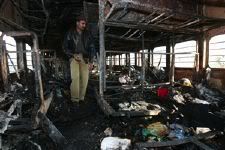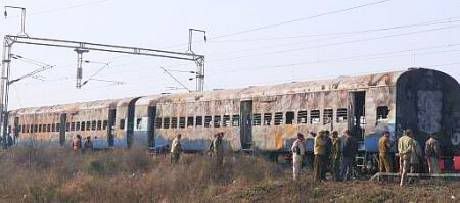Adil Najam
In a tragic development – and what is clearly the most serious threat to recent headways in the India-Pakistan peace process – a train bound from India to Pakistan (Samjhota Express) caught fire, reportedly because of two crude home-made bombs which exploded. Over 60 people are reported dead, most of them Pakistanis returning home, but the death toll also includes many Indians, including some Indian officials.


Here are some details, according to the BBC:
At least 64 people have been killed in a series of explosions and a fire on a Pakistan-bound train in the northern Indian state of Haryana, officials say. Passengers reported hearing two blasts as the train passed near Panipat, about 80km (50 miles) north of Delhi. The train – the Samjhauta Express – was part of a service taking passengers from Delhi to Lahore in Pakistan. A spokesman for Indian Prime Minister Manmohan Singh said the explosions were probably an “act of terror”. A number of other passengers were injured, and officials say the death toll may rise. The Samjhauta Express is one of two train services connecting India and Pakistan. After a two-year gap, it was reopened in 2004 as part of the peace process between the two countries.
Bloomberg adds the following information:
The blasts, which occurred after 11 p.m. last evening, were caused by crude explosives and struck two coaches of the train, India’s Railways Minister Lalu Prasad told reporters today in a televised interview in New Delhi. Pakistan condemned the blasts, saying India must conduct a thorough investigation into the act of terrorism. The train service between Indian and Pakistan is used by people who can’t afford air travel between the nuclear-armed neighbors that fought three wars since independence from British rule in 1947 and started talks to improve relations in 2003. The divided Himalayan territory of Kashmir is at the center of a dispute between the two countries that claim the region in full….
“Preliminary investigations show most of the victims are Pakistanis,” Pakistan’s foreign ministry spokeswoman Tasnim Aslam said in a phone interview from capital Islamabad today. “We expect India to conduct a thorough inquiry to find out the reasons behind this act.” The Pakistan High Commission in the Indian capital is being informed about possible casualties, zonal railways official B.N. Mathur said. A railway guard manning a signal cabin on the route between Delhi and Attari heard two explosions when the train crossed the station near Panipat, a refinery town, Mathur told reporters from the blast site….
India had the responsibility of providing security to the train in its part of the country, Aslam said, refusing to comment on the impact of the blasts on peace talks between the two countries. “We don’t know the motive behind the blasts.”

Pakistan has recently seen a spate of bombings in its major cities, and even before this some in government were pointing towards a ‘foreign hand’ in these bombings. Both countries have long played this game of ‘blame the foreign hand’, including in the recent tragic train bombings in Mumbai. The impulse to do so at the first sign of trouble is a natural one in the sub-continent. Given the deep distrust that exists between the two, it may even be understandable. But irrespective of the short-term political gains such finger-pointing might gain, it is not a very useful way to deal with deep tensions. One certainly hopes that this will not slide to that level and if, indeed, the purpose of those who did this terrible act was to hurt the peace process, then both countries will work together to make sure that this does not happen.
It is a good sign that Pakistan has announced that the visit by the Pakistan Foreign Minister to India will not be canceled. The signals from the Pakistan Foreign Ministry are sober but reasonable. According to The News:
Pakistan Foreign Minister Khurshid Kasuri Monday condemned a train blast in India which killed at least 66 people as a “horrendous act of terrorism” and said most of the victims were Pakistanis. Kasuri said he had asked the Indian government to investigate the incident overnight on a Samjhota Express. “It is a horrendous act of terrorism,” Kasuri told reporters during a function at the foreign office. “I would like the Indian government to investigate this incident. We are waiting for the results of the investigation,” he said. The minister said he had instructed the Pakistani High Commission in New Delhi to send staff to the site to help Pakistan nationals caught up in the blast.
The main leaders in India, including the Prime Minister and President, have also sent the right signals, including condolences to those who have died. The overtures from both sides are to focus on finding the terrorists who committed this atrocity. One hopes that their attentions will remain focussed on this purpose rather than succumbing to the impulse of scoring political points through the unwarranted politics of incrimination. Most of all, one hopes that neither country will allow the peace process to be derailed by this blast.




















































[quote comment=”35266″]An other option would be to make a clean break with the past and put down roots in the country of ones choosing, [/quote]
Does the same logic apply to Pakistanis settled in Europe and USA and the Middle East. Should they also not give up on keeping their and their children’s Pakistaniness artificially alive.
Neena: As directed by you, I have read this article in The Indian Express by Columnist Mr. Saeed Naqvi. The question that comes up is this: What Indian Muslims and their relatives in Pakistan to do? Should they move back to India and rejoin with their love ones. Should they bring all their love ones to Pakistan. Or should they keep on bobbing between the two countries and for how many generations. This is a question that only Indian Muslims can answer. An other option would be to make a clean break with the past and put down roots in the country of ones choosing, but I guess that option is hard and not considered by all. The temptation to go back and forth, again and again, will only prolong the agony and frustration that Mr. Naqvi is expressing in his Indian Express column. Since terrorism is not going to disappear any time soon, unfortunately the travel between these two countries will remain a risky business.
This article Step across border by Saeed Naqvi might interest those who want to know more about those fate less passengers.
Thank you Adnan for pointing it out, Samjhauta sounds perfect to me. Whenever someone writes something in other script there bound to be some discrepancies until we have some standard by authentic linguistic. I don’t think language distinguish between any borders. Just for the record my parents born in India and I was born and bred in Pakistan.
[quote comment=”35244″]Very tragic incident indeed. However, apart from this my worry is that there should be correct pronunciation and spellings of Urdu when written in Roman. Samjhota is wrong, it should be Samjhauta. This is a great blog and that is why I pointed out because lately transliteration mistakes are occurring regularly here.[/quote]
Ha..if there ever was a tangential comment… btw, Pakistanis pronounce many words differently than Indians (thank God :)).